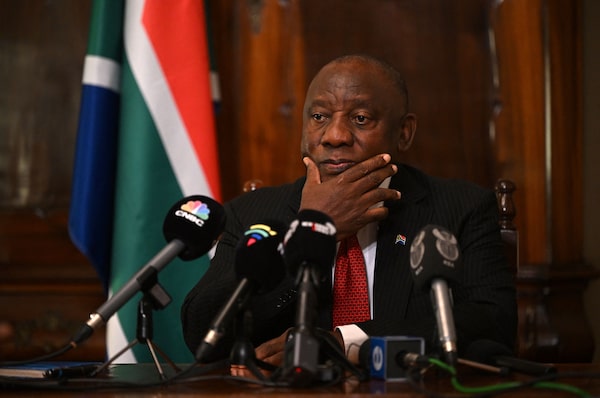
South Africa's President Cyril Ramaphosa speaks during a press conference in central London on November 24, 2022. (Photo by JUSTIN TALLIS / AFP) (Photo by JUSTIN TALLIS/AFP via Getty Images)JUSTIN TALLIS/AFP/Getty Images
A parliamentary inquiry has found preliminary evidence that South African President Cyril Ramaphosa may have committed “serious violations” of the Constitution and anti-corruption laws in his handling of a mysterious cash payment of at least US$580,000 at his wildlife ranch.
The report is a blow to Mr. Ramaphosa’s political future, boosting the chances that his rivals in the ruling party could mobilize to replace him at a mid-December leadership conference or in a parliamentary vote next year.
The growing scandal over the large sum of cash, apparently hidden for six weeks in a leather sofa at Mr. Ramaphosa’s ranch home and then stolen by intruders, also threatens to throw South Africa into political turmoil at a time when it is already struggling with economic stagnation and paralyzing electricity shortages.
The 82-page report by the inquiry, a panel of three legal experts headed by former chief justice Sandile Ngcobo, is severely damaging for Mr. Ramaphosa. It examines his official explanations for the cash affair and finds them riddled with inconsistencies and contradictions, sufficient to cast serious doubt on his version of what happened.
If the report is endorsed by the South African Parliament, it could lead to a formal impeachment process against the President. While the ruling African National Congress holds a majority in Parliament, an anti-Ramaphosa faction in the ANC could ally with opposition parties to push for impeachment.
Mr. Ramaphosa, who led a mine workers’ union during the apartheid era, entered the business world after the end of apartheid in 1994 and became one of South Africa’s richest people, with his wealth estimated at US$450-million by 2014. When he became South Africa’s deputy president in 2014, he announced he would exit from some businesses and put his other assets into an independently managed trust – but he retained his cattle and wildlife ranch as a hobby.
The latest controversy emerged when the cash theft at his ranch was revealed by Arthur Fraser, a former director of South Africa’s state intelligence agency. Mr. Fraser is widely seen as a close ally of former president Jacob Zuma, who was replaced by Mr. Ramaphosa in 2018 after a series of corruption scandals of his own.
The robbery at the Ramaphosa ranch had occurred in early 2020 but was never publicly disclosed until Mr. Fraser filed a criminal complaint against the President in June this year, more than two years later.
The cash, totalling US$580,000, was payment for the sale of a herd of 20 buffaloes to a Sudanese businessman, Mustafa Mohamed Ibrahim Hazim, according to Mr. Ramaphosa’s version. But the inquiry cited evidence that the amount may have been greater than that, and it found a series of “troubling unsatisfactory features” in the President’s explanation.
The inquiry found that Mr. Hazim’s identity and exact business were unclear, his decision to pay cash was mysterious, the absence of a proper tax invoice was peculiar and Mr. Hazim’s failure to collect the buffalo at any point over the following two years was puzzling.
“How did he get this huge amount of cash into South Africa?” the inquiry asked. “When he entered the country, did he declare to the South African authorities at the point of entry that he was carrying this amount of cash? What is the source of this cash he had in his possession? Why did Mr. Hazim not pay by money transfer?”
After the buffalo sale was completed, a lodge manager stashed the U.S. dollars under the cushions of a sofa in a spare bedroom in Mr. Ramaphosa’s private residence, which the manager considered the safest place, according to the President’s version. But this explanation “is vague and leaves unsettling gaps,” the inquiry found.
It noted the oddity that the cash was left in the sofa for 40 days, until the robbery occurred. “The normal practice is to bank the money on the next available banking day,” it said.
The inquiry also cited other oddities: There seemed to be no official record of the cash entering South Africa; the theft of the money was not reported to the police; the theft was investigated only by a presidential security chief; and nobody was charged for the robbery, even though suspects had been arrested.
“There is substantial doubt as to whether the foreign currency that was stolen is from the proceeds of the sale of 20 buffaloes,” it said. “We think that the President has a case to answer on the origin of the foreign currency that was stolen, as well as the underlying transaction for it.”
The inquiry also found that Mr. Ramaphosa may have violated the Constitution by running a private business and exposing himself to a conflict of interest, and he may have violated other rules by participating in a cover-up of the investigation into the theft.
In a brief response after the inquiry’s report was released on Wednesday night, Mr. Ramaphosa’s office said the report requires “careful reading and appropriate consideration in the interest of the stability of government and that of the country.”
John Steenhuisen, leader of the opposition Democratic Alliance, said the report is “a defining moment for our constitutional democracy.” He said the party would hold Mr. Ramaphosa accountable in Parliament.
 Geoffrey York
Geoffrey York